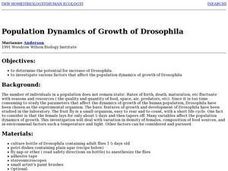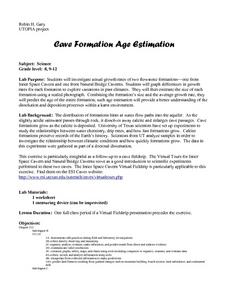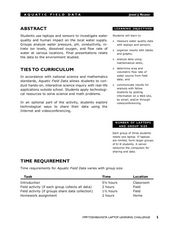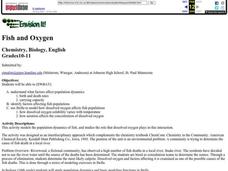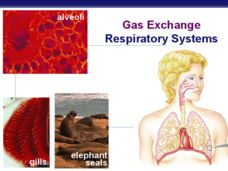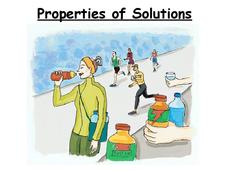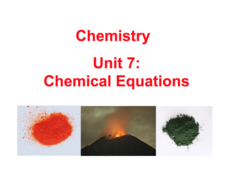Curated OER
A Plop and Fizz
Seventh graders perform an experiment to determine the effect of temperature on reaction rates. In this chemistry lesson, 7th graders take measurements and record data. They create a graph and analyze results.
Nuffield Foundation
Effect of Size on Uptake by Diffusion
Cell size is limited by the surface area to volume ratio, but why is this true? Scholars measure the surface area and volume of cubes before placing them into liquid. After a set amount of time, they measure the uptake by diffusion for...
Curated OER
The Ins and Outs of Equilibrium
In this equilibrium worksheet, students read about phase equilibrium and dynamic equilibrium. They answer nine questions based on their reading and their background in chemistry.
Curated OER
Population Dynamics of Growth of Drosophila
Students experiment with Drosophila to determine if density of female flies, food sources, temperature and light affect the population dynamics of growth. Students graph their data and compare their results to the number of human...
Curated OER
Oxygen Levels and Aquatic Plants and Animals
Learners design an experiment to test the effects of a change in the amount of dissolved oxygen of water on aquatic plants and animals. Questions are offered for exploration and experiment design. Results are tabulated and conclusions...
Curated OER
Pollution Solutions
Young scholars visit a local park to test the quality of the aquatic environments. They search for sources of pollution and examples of pollution control. Based on their obeservations and experiments, they rate their local environment.
Curated OER
Cave Formation Age Estimation
Learners investigate growth rates of flowstone formations. They view a virtual field trip and discuss how flowstones form. They observe the cave fieldtrip and predict the growth rate for a cave formation. They graph growth rates and...
Curated OER
Volcano Under the City
Students examine the different flow rates of liquids and how lava's viscosity influences flow. For this liquids lesson students complete several handouts and a lab activity.
Curated OER
Straw Chromatography
High schoolers separate food coloring using liquid chromatography. For this chemistry lesson, students explain the effects of different solvents on the rate of separation.
Curated OER
Why is the Ocean Salty?
In this ocean salt worksheet, students read about the processes that have lead to the salt content in the ocean. Then students complete 5 short answer questions.
Curated OER
Aquatic Field Data
Students use laptops and sensors to measure water quality and graph their results. In this aquatics instructional activity students post their results to a website or email.
Curated OER
Fish and Oxygen
Pupils explore what factors affect population dynamics, identify factors affecting fish populations, and use Stella to model how dissolved oxygen affects fish populations.
Curated OER
Solutions
Amateur chemists define and describe properties of solutions, compare solubilities, explain how solutes affect freezing and boiling points, describe acid and base properties, and more! This educational PowerPoint provides information and...
California Academy of Science
Coral and Chemistry
Using cabbage juice as a pH indicator, future scientists explore the effect of increasing carbon dioxide on the pH of the ocean and relate it to the health of coral reefs. Ideal for an earth or environmental sciences course, this lesson...
Virginia Department of Education
Mystery Iron Ions
Young chemists perform an experiment to determine if a compound is iron (II) chloride or iron (III) chloride. Then they determine the formula, balance the equation, and answer analysis questions.
Curated OER
Gas exchange: Respiratory Systems
The need for a respiratory system in humans versus being reliant on gas exchange structures is demonstrated. There are many details about the advantages and disadvantages of each mechanism. Students are able to learn about the...
Curated OER
Gas Exchange And Respiratory Systems.
Explore structures within the realm of gas exchange in terrestrial and aquatic life. The excellent, labelled diagrams and clear descriptions help your students view the different structures and adaptations that have developed. The 29...
California Academy of Science
Fish Prints
What do a dead fish, conservation, and paint have in common? The answer is a great lesson plan about fish anatomy, fun print making techniques, and unsustainable fishing practices. The class will start by making fish prints with a...
California Academy of Science
Global Climate Change and Sea Level Rise
Ice is nice, and its condition on the planet has a significant effect. Junior geoscientists experiment with ice melting in both water and on land to discover how each affect the rising sea level. This detailed lesson outline even...
US Environmental Protection Agency
Role of Plants in Water Filtration
Investigate the amazing ability of plants to filter contaminants from water with this series of in-class demonstrations. After placing six small, potted plants in plastic cups, different solutions and mixtures are poured into them that...
Science Geek
Properties of Solutions
Study the properties of solutions as they relate to mixtures. The slide show presents the key concepts involved with solutions including solvents, solutes, solubility, and electrolytes. Scholars learn the basics of the properties of...
Curated OER
Module 7 Revision Guide - Chemistry
Two versions of this handout are provided, the second with more detailed information on the same topics. Chemistry aces survey chemical reactions, heat energy transferred, and the action of enzymes by reading this resource. You can...
Normal Community High School
Chemical Equations
Viewers learn how to identify the substances in a chemical reaction, how to balance it, and the different types of chemical reactions by watching a presentation that also includes a review of monomers and polymers. The presentation ends...
Curated OER
Chalk Chromatography
Your chemistry class is sure to love this experiment on column chromatography, as demonstrated with chalk sticks and felt tip markers. Pupils use sidewalk chalk (another inexpensive form of chalk stick) to demonstrate adsorption and the...





